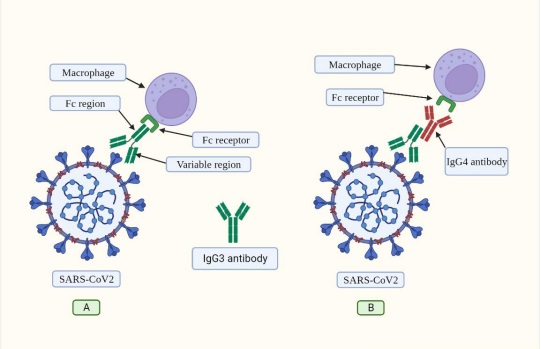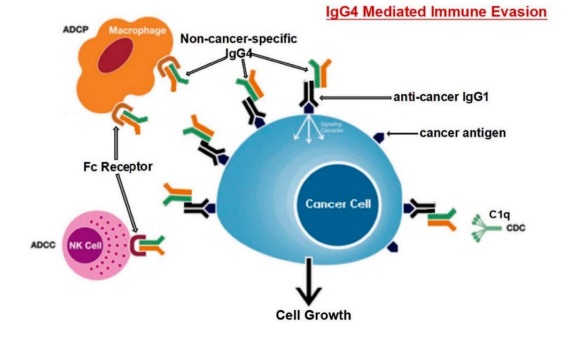BREAKING COVID-19 NEWS! International Study Finds That SARS-CoV-2 Induces IgG4 Synthesis To Evade The Immune System!
Thailand Medical News Team Aug 10, 2023 2 years, 6 months, 4 days, 2 hours, 32 minutes ago
COVID-19 News: In a groundbreaking international study involving researchers from Autlán Regional Hospital-Mexico, University of Guadalajara-Mexico, King Abdulaziz University-Saudi Arabia, Genetic Engineering and Biotechnology Research Institute-Egypt, and University of South Florida, Tampa-USA, a compelling revelation has emerged regarding the immune evasion tactics employed by the notorious SARS-CoV-2 virus. This study delves into the intricate interactions between the virus and the human immune system, shedding light on how SARS-CoV-2 exploits the production of IgG4 antibodies to thwart the body's defense mechanisms. The implications of this discovery stretch beyond COVID-19, bearing intriguing similarities to evasion strategies employed by cancer cells.
 A. In normal conditions, the IgG3 antibody binds to the spike protein using its variable region. This antibody has a constant region (Fc) that is recognized by the corresponding receptor found on macrophages and other immune cells. This mechanism is called “opsonization”, and it marks foreign pathogens for phagocyte destruction. B. SARS-CoV-2 induces IL-6 production, altering the normal Treg or Breg cells phenotype and making these cells produce IgG4 antibodies (depicted in red). The constant region of the IgG4 antibody binds to the constant region of IgG3, thus preventing the binding of said antibody to its receptor located on the macrophage. In this way, the IgG3 effector functions are blocked.
Immune Suppression in COVID-19
A. In normal conditions, the IgG3 antibody binds to the spike protein using its variable region. This antibody has a constant region (Fc) that is recognized by the corresponding receptor found on macrophages and other immune cells. This mechanism is called “opsonization”, and it marks foreign pathogens for phagocyte destruction. B. SARS-CoV-2 induces IL-6 production, altering the normal Treg or Breg cells phenotype and making these cells produce IgG4 antibodies (depicted in red). The constant region of the IgG4 antibody binds to the constant region of IgG3, thus preventing the binding of said antibody to its receptor located on the macrophage. In this way, the IgG3 effector functions are blocked.
Immune Suppression in COVID-19
The initial stages of the COVID-19 pandemic were marked by a flurry of clinical observations and scientific investigations into the ways SARS-CoV-2 interacts with the immune system. One alarming trend that emerged as covered in various studies and
COVID-19 News reports, was the ability of the SARS-CoV-2 virus to induce immune suppression in certain individuals, hampering the host's ability to mount an effective defense. Research revealed that COVID-19 patients exhibited reductions in key immune cells, including natural killer cells and T cells, critical components of the body's response to viral infections. Additionally, SARS-CoV-2 was found to directly infect immune cells, further undermining their function and exacerbating the immune response.
Unveiling the IgG4 Antibody Connection
One notable finding from the study is the virus's propensity to stimulate the synthesis of IgG4 antibodies. IgG4 is a subclass of human immunoglobulin G (IgG) antibodies, characterized by its unique structural features. Traditionally, IgG4 has not been considered a major player in viral infections, with research primarily focusing on other IgG subclasses. However, this study illuminates the role of IgG4 in SARS-CoV-2 infection and its potential impact on immune evasion.
The IgG4 Immunological Tolerance Mechanism
The study presents a captivating hypothesis: IgG4 antibodies produced by B cells in response to SARS-CoV-2 infection may generate an immunological tolerance that prevents the virus's elimination. This phenomenon leads to persistence and chronic infection,
mirroring strategies employed by cancer cells to evade immune surveillance. This groundbreaking insight unveils a new layer of complexity in the virus-host interaction, with potentially far-reaching implications.
Viruses and Chronic Infections
Viruses, including SARS-CoV-2, are adept at evolving tactics to maintain chronic infections within hosts. This phenomenon, known as "metastable virus-host immune response interaction equilibrium," has been observed in viruses like hepatitis B virus (HBV), human immunodeficiency virus (HIV), and hepatitis C virus (HCV). These viruses establish a delicate balance with the host's immune response, allowing them to persist over extended periods and evade detection and elimination.
Persistent Infection and Clinical Outcomes
The study draws attention to a compelling observation: some COVID-19 patients, despite appearing to recover, experienced progressively worsening clinical conditions, ultimately leading to their demise. Autopsies of these patients unveiled a surprising revelation - the presence of SARS-CoV-2-infected cells in their lungs, even in the absence of detectable viral genetic material. This phenomenon raises questions about the true nature of recovery and suggests that chronic infection could be a hidden reality even after initial symptomatic relief.
IgG4 and COVID-19 Clinical Outcomes
The research delves into the intricate world of immunoglobulin G (IgG) subclasses and their impact on COVID-19 clinical outcomes. Specifically, the study investigates the correlation between IgG4 production and disease severity. While IgG1 and IgG3 subclasses were more prevalent in COVID-19 patients, IgG4's role remained less explored.
However, recent evidence indicates that SARS-CoV-2 infection stimulates IgG4 synthesis, and elevated IgG4 levels were associated with increased COVID-19 mortality. This suggests that IgG4 antibodies might play a significant role in exacerbating the disease.
Immune Evasion Mechanism
The study sheds light on the potential mechanisms through which IgG4 antibodies contribute to immune evasion. One hypothesis suggests that high IgG4 levels could render individuals more susceptible to SARS-CoV-2 infection due to IgG4's weaker in vitro neutralizing ability compared to other IgG subclasses. Another intriguing angle involves the interaction between IgG4 and interferon-gamma (IFN-γ), an essential component of antiviral immunity. Autoantibodies against IFN-γ, found in some severe COVID-19 cases, could hinder the immune response and contribute to fatal pneumonia.
Similarities with Cancer Cells
The study draws an astonishing parallel between the IgG4-mediated immune evasion mechanism employed by SARS-CoV-2 and evasion strategies evolved by cancer cells. In both cases, the immune system's vigilance is subverted, allowing the virus or cancer cells to persist within the host. This convergence of strategies underscores the intricacies of viral infections and the potential therapeutic implications of unraveling these mechanisms.
 Schematic representation of the hypothesized mechanism for immune evasion by cancer cells using B lymphocyte-produced IgG4 . Long-term contact with tumour antigens induces B cells to switch class and produce IgG4. Because of its unique structural and biological characteristics, increased IgG4 in the cancer microenvironment creates an effective immune evasion mechanism for the disease. The terms antibody-dependent cell mediated cytotoxicity (ADCC), antibody-dependent cell phagocytosis (ADCP), complement-dependent cytotoxicity (CDC), and natural killer cells (NK) are abbreviations for these processes, respectively.
Conclusion
Schematic representation of the hypothesized mechanism for immune evasion by cancer cells using B lymphocyte-produced IgG4 . Long-term contact with tumour antigens induces B cells to switch class and produce IgG4. Because of its unique structural and biological characteristics, increased IgG4 in the cancer microenvironment creates an effective immune evasion mechanism for the disease. The terms antibody-dependent cell mediated cytotoxicity (ADCC), antibody-dependent cell phagocytosis (ADCP), complement-dependent cytotoxicity (CDC), and natural killer cells (NK) are abbreviations for these processes, respectively.
Conclusion
The international study's findings illuminate a previously unexplored facet of SARS-CoV-2 infection, revealing the virus's manipulation of IgG4 antibodies to evade the immune system. The parallels with cancer cell evasion strategies underscore the complex nature of immune responses to pathogens. These insights have the potential to reshape our understanding of COVID-19 and pave the way for innovative therapeutic interventions targeting immune evasion mechanisms.
The study findings were published on a preprint server and are currently being peer reviewed.
https://www.preprints.org/manuscript/202308.0776/v1
For the latest
COVID-19 News, keep on logging to Thailand Medical News.

